Related Research Articles
Political correctness is a term used to describe language, policies, or measures that are intended to avoid offense or disadvantage to members of particular groups in society. Since the late 1980s, the term has been used to describe a preference for inclusive language and avoidance of language or behavior that can be seen as excluding, marginalizing, or insulting to groups of people disadvantaged or discriminated against, particularly groups defined by ethnicity, sex, gender, or sexual orientation. In public discourse and the media, the term is generally used as a pejorative with an implication that these policies are excessive or unwarranted.

The term multiculturalism has a range of meanings within the contexts of sociology, political philosophy, and colloquial use. In sociology and in everyday usage, it is a synonym for "ethnic pluralism", with the two terms often used interchangeably, and for cultural pluralism in which various ethnic and cultural groups exist in a single society. It can describe a mixed ethnic community area where multiple cultural traditions exist or a single country within which they do. Groups associated with an indigenous, aboriginal or autochthonous ethnic group and settler-descended ethnic groups are often the focus.

Cultural diversity is the quality of diverse or different cultures, as opposed to monoculture. It has a variety of meanings in different contexts, sometimes applying to cultural products like art works in museums or entertainment available online, and sometimes applying to the variety of human cultures or traditions in a specific region, or in the world as a whole. It can also refer to the inclusion of different cultural perspectives in an organization or society.
Diversity training is any program designed to facilitate positive intergroup interaction, reduce prejudice and discrimination, and generally teach individuals who are different from others how to work together effectively.
The term "minority group" has different usages, depending on the context. According to its common usage, the term minority group can simply be understood in terms of demographic sizes within a population: i.e. a group in society with the least number of individuals, or less than half, is a "minority’. Usually a minority group is disempowered relative to the majority, and that characteristic lends itself to different applications of the term minority.

Half-caste is a term used for individuals of multiracial descent. It is derived from the term caste, which comes from the Latin castus, meaning pure, and the derivative Portuguese and Spanish word casta, meaning race. Terms such as half-caste, caste, quarter-caste and mix-breed were used by colonial officials in the British Empire during their classification of indigenous populations, and in Australia used during the Australian government's pursuit of a policy of assimilation. In Latin America, the equivalent term for half-castes was Cholo and Zambo. The term is now considered offensive

Americentrism, also known as American-centrism or US-centrism, is a tendency to assume the culture of the United States is more important than those of other countries or to judge foreign cultures based on American cultural standards. It refers to the practice of viewing the world from an overly US-focused perspective, with an implied belief, either consciously or subconsciously, in the preeminence of American culture.
Emotional labor is the process of managing feelings and expressions to fulfill the emotional requirements of a job. More specifically, workers are expected to regulate their personas during interactions with customers, co-workers, clients, and managers. This includes analysis and decision-making in terms of the expression of emotion, whether actually felt or not, as well as its opposite: the suppression of emotions that are felt but not expressed. This is done so as to produce a certain feeling in the customer or client that will allow the company or organization to succeed.
In a legal context, a chilling effect is the inhibition or discouragement of the legitimate exercise of natural and legal rights by the threat of legal sanction. A chilling effect may be caused by legal actions such as the passing of a law, the decision of a court, or the threat of a lawsuit; any legal action that would cause people to hesitate to exercise a legitimate right for fear of legal repercussions. When that fear is brought about by the threat of a libel lawsuit, it is called libel chill. A lawsuit initiated specifically for the purpose of creating a chilling effect may be called a strategic lawsuit against public participation (SLAPP).
Self-censorship is the act of censoring or classifying one's own discourse. This is done out of fear of, or deference to, the sensibilities or preferences of others and without overt pressure from any specific party or institution of authority. Self-censorship is often practiced by film producers, film directors, publishers, news anchors, journalists, musicians, and other kinds of authors including individuals who use social media.
Slightly over half of the homepages of the most visited websites on the World Wide Web are in English, with varying amounts of information available in many other languages. Other top languages are Spanish, Russian, Persian, French, German and Japanese.
Censorship in the People's Republic of China is mandated by the PRC's ruling party, the Chinese Communist Party (CCP). It is one of the strictest censorship regimes in the world. The government censors content for mainly political reasons, such as curtailing political opposition, and censoring events unfavorable to the CCP, such as the 1989 Tiananmen Square protests and massacre, pro-democracy movements in China, the Uyghur genocide, human rights in Tibet, Falun Gong, pro-democracy protests in Hong Kong, and aspects of the COVID-19 pandemic. Since Xi Jinping became the general secretary of the Chinese Communist Party in 2012, censorship has been "significantly stepped up".

Australians, colloquially known as Aussies, are the citizens, nationals and individuals associated with the country of Australia. This connection may be residential, legal, historical or ethno-cultural. For most Australians, several of these connections exist and are collectively the source of their being Australian. Australian law does not provide for a racial or ethnic component of nationality, instead relying on citizenship as a legal status.
According to some theories, emotions are universal phenomena, albeit affected by culture. Emotions are "internal phenomena that can, but do not always, make themselves observable through expression and behavior". While some emotions are universal and are experienced in similar ways as a reaction to similar events across all cultures, other emotions show considerable cultural differences in their antecedent events, the way they are experienced, the reactions they provoke and the way they are perceived by the surrounding society. According to other theories, termed social constructionist, emotions are more deeply culturally influenced. The components of emotions are universal, but the patterns are social constructions. Some also theorize that culture is affected by the emotions of the people.

Censorship is the suppression of speech, public communication, or other information. This may be done on the basis that such material is considered objectionable, harmful, sensitive, or "inconvenient". Censorship can be conducted by governments, private institutions and other controlling bodies.
Quebecers or Quebeckers are people associated with Quebec. The term is most often used in reference to descendants of the French settlers in Quebec and people of any ethnicity who live in the province.
Mass media regulations are a form of media policy with rules enforced by the jurisdiction of law. Guidelines for media use differ across the world. This regulation, via law, rules or procedures, can have various goals, for example intervention to protect a stated "public interest", or encouraging competition and an effective media market, or establishing common technical standards.

"Think of the children" is a cliché that evolved into a rhetorical tactic. In the literal sense, it refers to children's rights. In debate, it is a plea for pity that is used as an appeal to emotion, and therefore may become a logical fallacy.
Censorship in Bolivia can be traced back through years of conflict between Bolivia's indigenous population and the wealthier population of European descent. Until Bolivia democratized in 1982, the media was strictly controlled.
References
- ↑ Thompson, D. (1995). The Concise Oxford Dictionary of Current English. Clarendon Press.
- ↑ Dogra, Nisha; Karim, Khalid (2005). "Diversity training for psychiatrists". Advances in Psychiatric Treatment. 11 (3): 159–167. doi: 10.1192/apt.11.3.159 . Retrieved December 2, 2011.